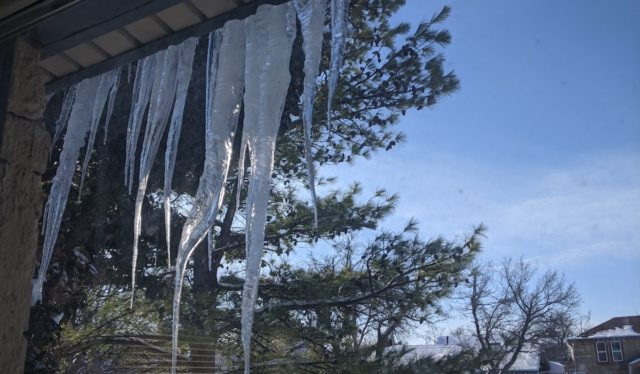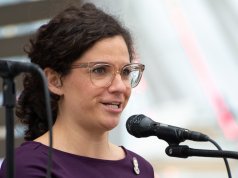
This morning at 10:30, the Oklahoma Supreme Court will hear oral arguments as to whether OG&E consumers will be on the hook for up to $800 million in bonds to pay off fuel charges incurred by the publicly-traded utility during the cold snap in February 2021.
Last Valentine’s Day, Oklahoma reached some of its lowest temperatures on record. People cranked up their furnaces, causing a spike in demand, and, thanks to poor planning and infrastructure, gas distribution facilities froze, putting a squeeze on supply.
This led to a breakdown in the natural gas industry, causing the spot markets (real-time virtual markets where natural gas contracts are priced) to spiral out of control. As a result, utilities in Oklahoma — and subsequently their customers — were purchasing gas at a price hundreds of times higher than what it normally costs.
Oklahoma utilities spent more on gas in three days than they usually do in more than a year. The amount spent could have weatherized most of the infrastructure in the state’s gas industry.
No gas operator, storage facility or midstream distributor incurred $4 billion in expenses in three days in February. The issue is that the market broke and utilities weren’t prepared for cold weather, but consumers are left holding the bag.
Passing the buck
As the ice melted last year, a whirlwind process started to figure out who would pay for these exorbitant costs. And from that point on, every facet of state government has passed the buck on this issue, enriched powerful special interests and failed to protect consumers.
The Legislature rammed through a law allowing for securitization of the company debts. This lets utility companies ask the obscure Oklahoma Development Finance Authority to sell bonds and purchase the utility debt, with the companies adding an additional fuel charge to customer bills, thus spreading out the cost of fuel out over decades. Now, instead of getting a bill of several thousand dollars for February 2021, we all get to pay an additional charge for many years to come. You don’t need a math degree to understand that consumers will be paying the same enormous bill, only more slowly and with interest.
Next, Gov. Kevin Stitt signed off on this plan. There are policy prescriptions, like pursuing federal disaster relief or strengthening energy regulations to mitigate the cost to consumers for a weather disaster, but the Stitt administration has pursued none of them.
Then there is the attorney general, who is supposed to be the people’s lawyer in these sorts of regulatory fights. In initial conversations and filings after the passage of the new securitization program, the Attorney General’s Office, under Mike Hunter, seemed interested in investigating what happened and the many important legal questions about who would end up paying for it and why.
After Hunter’s sudden resignation, however, his successor, John O’Connor, a corporate attorney and Stitt’s handpicked successor, has said little about the supposed investigation. (The Federal Energy Regulatory Commission investigated 190 natural gas market surveillance alerts, but only one examination remains open.) Meanwhile, O’Connor’s office did not sign OG&E’s joint stipulation at the Corporation Commission, an agreement between parties on the case as to what the charges should be, but it also avoided opposing the arrangement or arguing for more transparency.
The Corporation Commission voted 2-1 to approve the OG&E securitization proposal, despite protests from AARP and community groups such as VOICE, who expressed serious concerns. Republican Commissioner Bob Anthony also raised many red flags about conflicts of interest.
Now, the ODFA, which is going to sell the bonds, buy the utility debt and handle repayment of the new bond debt, is required to bring the proposal before the Supreme Court. The ODFA has never run a program this large.
Who should pay?
The issue with all of this is that, to date, nobody has determined who got paid the astronomical spot market prices. Oklahoma’s regulated utilities, OG&E, ONG and PSO are subsidiaries of OGE Energy Corp, ONE Gas and American Electric Power, respectively. Some of these parent companies own interests in power generation, midstream operations, storage and other gas industry interests. Somebody made this money and we need to know who.
While the utilities are prohibited by law from making a profit on fuel charges, their parent or sister companies are under no such obligation. We still do not know who exactly got paid, whether there was corporate self-dealing or other troubling arrangements.
Why should consumers pay for any of that? Lawyers will make convoluted legal arguments about contract law, energy markets and the regulatory environment, blaming everyone from state regulators and the federal government to Mother Nature, but any person with an ounce of common sense can smell the stench of corruption a mile away.
Without knowing who got paid, how much they were paid and for what quantity of gas, it is not prudent or reasonable to approve this process and let the securitization ship set sail. The Supreme Court is the last line of defense in protecting the public interest and demanding real transparency accountability for what happened in February 2021.
While these systems are complex, all available information leads back to a basic question of fairness. The Oklahoma Supreme Court has an opportunity to intervene and make everyone involved come up with a better solution. It should take that opportunity and deny the securitization order.






















